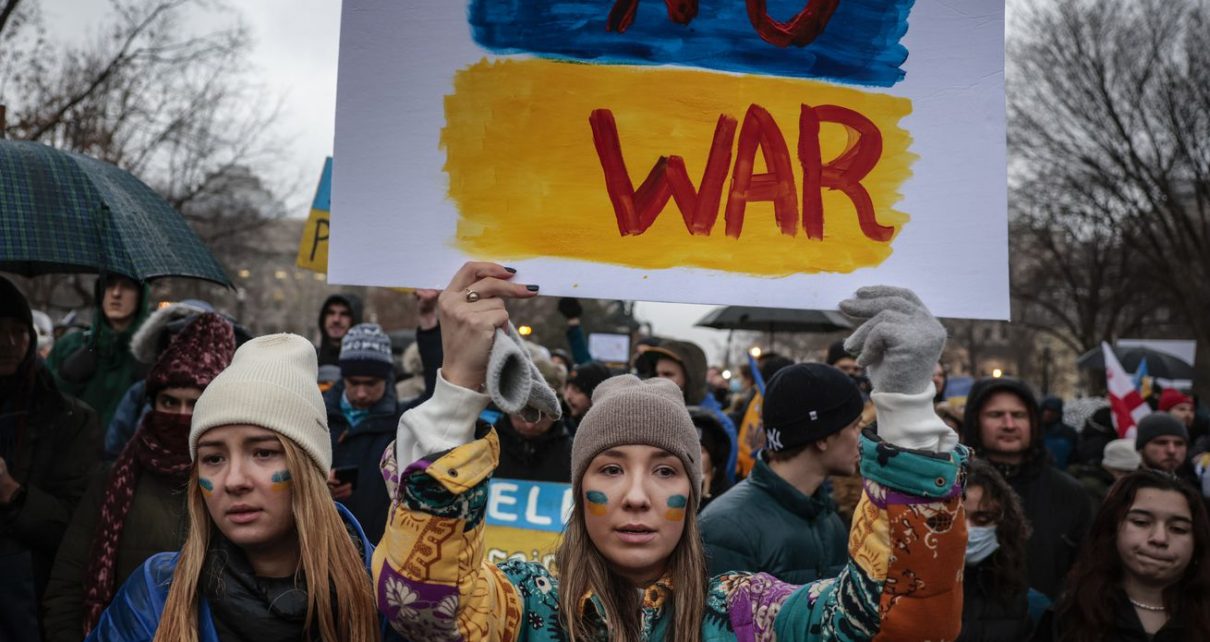
Progressives are grappling with the US response — and America’s role in the world.
The West’s response to Russian President Vladimir Putin’s invasion of Ukraine has been swift, unified, and wide-ranging, and brings military, economic, and political tools to bear. But during a global outpouring of support of Ukraine, scholars and activists on the left have pointed out what they see as a glaring inconsistency — the world doesn’t rise up in similar a collective rage every time other countries are attacked, invaded, or occupied.
So, what are progressives for, in a moment when there are constant appeals for the West to do more to stop Putin’s war in Ukraine? People on the left are not just putting forward specific policies. They are calling on America to reckon with its conduct in recent wars. In short, to reevaluate its role in the world.
Progressive members of Congress share a consensus that Putin has pursued an illegal and malicious war. They are pressing the Biden administration to support refugees and humanitarian aid. They want Biden to pursue diplomacy even if it seems impossible — and that Putin isn’t interested in diplomacy. “But that doesn’t mean you stop diplomacy, because you never stop diplomacy,” Matt Duss, a foreign policy adviser to Sen. Bernie Sanders (I-VT), told me.
Progressives are divided about the effects that sanctions could have on ordinary Russians, the long-term dangers of arming Ukrainians, and how the Ukraine war relates more broadly to the role of the US in the world.
But those ideas around policy have been obscured by accusations of American duplicity. “There is no contradiction between standing with the people of Ukraine and against Russia’s heinous invasion and being honest about the hypocrisy, war crimes and militarism of the US and NATO,” Jeremy Scahill, editor-at-large and cofounder of the Intercept, tweeted last week.
Though it seemed that for every person who affirmed his tweet, there was an accusation of whataboutism or an attack on Scahill’s credibility. “You should go to Ukraine,” retorted NPR reporter Frank Langfitt. This rejoinder taps into a bigger debate. Centrists and hawks have accused the left of moral relativism.
Yet the conversations I’ve had with activists and policymakers on the left show that you can highlight Russian war crimes and find a nuanced way to explain that America is not a neutral party in the world. These dynamics are connected, many progressives say, and that thinking about conflicts comparatively can lead to a deeper understanding of how the US sees the world along with better policy solutions.
As this geopolitical conflict tests the conventions and assumptions of US foreign policy since the beginning of the war on terrorism, the left is advocating for a new, consistent, and rights-based approach to global affairs.
“A less stupid and possibly even smart conversation”
Rep. Ro Khanna (D-CA) says that the application of human rights across countries and conflicts — including in Ukraine — is central to how progressives see foreign policy.
“The misconception of the center is that progressives somehow have a frame of moral relativism or appeasement, and the moral relativism here is in Saudi Arabia, and the catastrophe of what’s going on in Yemen,” he told me. “The moral relativism is the lack of recognition of human rights with Uighurs or in other parts of the world.”
US President Joe Biden has framed the fight against Russia at last week’s State of the Union address as freedom against tyranny, yet US partners like Egypt, Saudi Arabia and the United Arab Emirates would fall into the latter category. Secretary of State Antony Blinken has regularly invoked international law, something we rarely hear mentioned when Palestinians face Israeli occupation. The tactics the Biden administration has implemented to counter Russia — boycotts, sanctions, and divestment (BDS), naming war crimes, cooperating with the International Criminal Court — are not considered in other contexts.
The plight of Ukrainians is a struggle on the side of human rights and, as one writer put it, “solidarity with the oppressed.” Yet it is not an apologia for Putin’s viciousness to say that the US participates in shadow wars, and that those who die outside Europe, rarely get primetime coverage. Nor is it any justification of Putin’s actions to examine his use of violence within recent history and international relations, or to say that US policies may have made this war more likely.
“There is a well-earned skepticism among many on the left around Washington and war,” Duss told me. “What progressives are trying to push for is a less stupid and possibly even smart conversation about foreign policy, and the uses of American power, and the limits of American power.”
Global and American leftists argue, in fact, that such questions are crucial to the development a coherent, ethical, and effective response to Russia’s invasion. It’s so infrequent that wars grab the attention of an American public, which largely avoids international news, and people on the left have found an opportunity to point out the fact that US policies have often been militaristic — and don’t have to be.
Solutions from the left
Progressives say critiques of US military engagement and concern for human rights have guided suggestions for how the US responds to Russia. “We don’t want to just be against things anymore. We want to be assertively creating the alternative solutions to the war machine itself,” said Pam Campos-Palma of the Working Families Party.
Progressive lawmakers have come out against a no-fly zone, which the Biden administration and NATO have also unequivocally ruled out because it would escalate the conflict into a larger war with a nuclear-armed country.
For many progressives, a switch to green energy is urgent because fossil fuel-driven economies empower autocrats like Putin. “Our dependence on natural gas and fossil fuels is a national security issue,” Khanna said.
There are also parts of a progressive response woven into the Biden administration’s response. The crackdown on dirty money is central to the Biden administration’s targeted sanctions on Russia. Progressives in Congress have spearheaded such anti-corruption efforts in the Democratic primaries, and Biden adopted some of these policies even before Putin invaded Ukraine.
Progressives also note the shortcomings of Biden’s approach. Rep. Ilhan Omar (D-MN) has emphasized that sanctions are a weapon of war that unfairly affect civilians in repressive countries like Iran, Venezuela, and now Russia. In a recent statement, she supported sanctions “targeted at Putin, his oligarchs, and the Russian military” and opposed “broad-based sanctions that would amount to collective punishment of a Russian population that did not choose this.”
Similarly, many activists and scholars stand against the American policy of sending weapons to Ukraine. “There is something very hypocritical about all of these external powers who have fanned this conflict, and who are not going to fight in Ukraine, flooding the country with weapons to make sure it continues to be a war zone, and then calling that support,” Tony Wood, the author of Russia Without Putin, said on The Dig podcast in February.
The difficult task for progressives is to propose constructive solutions that are centered around diplomacy and humanitarian concerns without falling into the worst tendencies of American military power.
“I’m very uneasy about the degree to which support for the Ukrainian resistance can turn into support for continuation and then escalation of this war,” Wood said. “The solidarity of Ukraine is one thing, and supporting the continuing escalation of the war is another thing — we should try and stop that.”
What about whataboutism?
Contextualizing Putin’s aggression is not the same as buying into Russia’s fallacious pretexts for the invasion or being a tankie. To be sure, those people exist, and some ostensibly left-wing podcasters have been funded by Russian entities. Yet explanations of how policy and historical dynamics factor into Putin’s strategy have been downplayed by many authoritative voices. In discussions online about Ukraine, former Ambassador Michael McFaul, a regular contributor to the liberal MSNBC, has complained about “BS whataboutism,” or the technique of deflecting criticism by retorting with a similar accusation.
Russia and other autocratic governments have used whataboutism as a tactic to avoid answering for their crimes against their civilians, but this epithet has also been leveled against progressives’ nuanced questions and criticisms.
Something similar happened after the September 11, 2001, attacks, when stepping back from the war on terror to consider its broader implications was painted as anti-American. Rep. Barbara Lee (D-CA) urged restraint and voted against the Afghanistan war, because, she said, “military action will not prevent further acts of international terrorism against the United States.” Lee, the only member of Congress who stood against the war, was derided by some as unpatriotic and a communist.
At the time, progressive thinkers, like Noam Chomsky, called for strategic empathy in discussion of the terrorist group Al-Qaeda’s worldview and in thinking through the American response. “We can express justified horror; we can seek to understand what may have led to the crimes, which means making an effort to enter the minds of the likely perpetrators,” he wrote. But the George W. Bush White House instead launched a misguided invasion that turned into a two-decade US military presence in Afghanistan, to few strategic ends.
A nuanced understanding of NATO’s role can hold multiple truths at once: that many former Soviet countries wanted to join NATO; that welcoming them into the alliance had geopolitical consequences, even if the West painted the move as primarily as a decision of democracy versus dictatorship; and that Putin nevertheless chose war, violating another country’s sovereignty and fomenting a humanitarian crisis. Several journalists, including myself, have documented how the enlargement of NATO on Russia’s border has antagonized Putin and perhaps recklessly advanced militaristic policies.
It is also important to examine not just NATO expansion but NATO itself, a military alliance that has been involved in the invasion of countries. “Putin and Russia have decided effectively to mimic the West. It’s awful act of mimicry,” said Tariq Ali, the author and scholar who writes for the London Review of Books.
Ali dismisses the mainstream American perspective that NATO is purely a defensive or peace-keeping organization. “This argument just doesn’t wash if you look at all the wars NATO’s fought, not just Afghanistan, but parts of Africa, Somalia, for instance.” For Ali, who is active in the European antiwar movement, you can’t isolate Russia’s aggression in Ukraine from its attacks in Syria and Libya, or the way the US has violated international law in Afghanistan and Iraq.
American administrations — across parties and with the endorsement or complacency of Congress — have pursued policies that deteriorated global norms. Presidents have advanced intensive drone strikes abroad and the indefinite detention of prisoners at Guantanamo Bay. And backed by Congress, civil liberty-defying surveillance, like that allowed by the PATRIOT Act, wore away at protections for human rights at home and abroad.
The US has also actively concealed, and in the process normalized, the deaths of civilians in many conflicts. “So far, according to reports, the killing of civilians [in Ukraine] is nowhere near what it was in Iraq, or Syria, or the Yemen, or Libya, where human lives didn’t seem to matter,” said Ali.
A firm commitment to human rights is not whataboutism; it’s consistency. The left isn’t raising issues with the war in Yemen to deflect criticism from Putin; it’s doing so to show that the US military policies have unintended consequences for civilians. This, progressives say, is a lesson worth heeding as the US sends “lethal aid” to Ukraine and reportedly makes plans to support an insurgency.
As for pointing out past US violations of international law or its own support for tyrants?
“If folks had been listening to progressives, then these cries of the US being hypocritical would be a lot less true, because the US would have not done many of these things in the first place,” said Stephen Miles of the advocacy group Win Without War.




